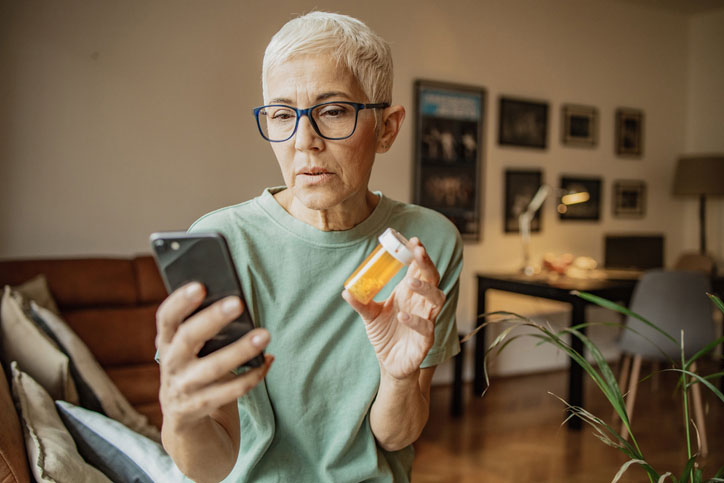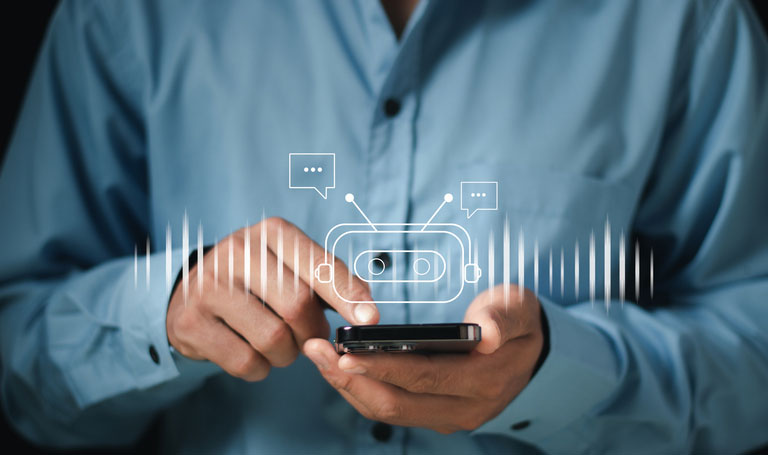Written by Dr. Emily R. Thornton, PhD, LCADC , Last Updated: November 12, 2025
AI and wearable technology are transforming addiction counseling through therapeutic apps, machine learning algorithms that predict relapse risk, and health monitors that provide real-time patient data. These tools enhance traditional therapy methods, such as CBT and DBT, enabling counselors to work more efficiently while improving patient outcomes through 24/7 support and crisis intervention.
Table of Contents
Substance abuse counseling is a profoundly personal field of practice. You'll find, time after time, that breakthroughs come through making human connections with people whose humanity has been worn thin by addiction. When all hope seems lost, it's that bond between people that brings them back.
So artificial intelligence isn't something you probably give much thought to in your investigations into how to become a SUD counselor. You're probably imagining most of your interaction with technology being a word processor for writing reports or a clunky state reporting system.
But it turns out there are many parts of the addiction treatment process that technology can improve. In fact, it is already happening.
New technology breakthroughs won't replace addiction counselors, but they can make the job more efficient and more effective.
Many SUD therapists are now beginning to incorporate high-tech solutions into their daily practice. In some cases, clients come in the door having already tried an independent app that by itself didn't help them get clean. In others, therapists themselves are experimenting with off-the-shelf systems that provide innovative treatment aids.
Within a decade, most substance abuse counselors will be using these kinds of technologies. And newer developments are in the pipeline.
Rather than threatening substance use disorder counseling jobs, these tools represent a meaningful way to leverage the time of counselors who are spread too thin and to reach populations that otherwise aren't easy to connect with.
How Technology Enhances Traditional Therapy Practices

Addiction counselors across the country rely every day on evidence-based treatments like cognitive behavioral therapy (CBT) and dialectical behavior therapy (DBT), and on other related techniques for reinforcement and contingency management.
While effective, these techniques are not mysterious. They rely on provoking thought and providing motivation when it's needed. With no disrespect to professional behavioral and substance abuse counselors who use these techniques, the concepts themselves don't take particularly advanced artificial intelligence to implement.
This makes it relatively easy to put together apps that offer up some of the basics of what a trained addiction therapist provides.
Core Functions of Addiction Counseling Apps
Educational Skill Development:
- Instant lookup and reminders of the hazards and dangers of using various illicit substances
- Building refusal skills through interactive scenarios
- Guidance on family and social relationships
- Tools for developing daily recovery plans
Delivering Therapeutic Feedback:
- Managing and reducing harmful thoughts through CBT techniques
- Promoting progressive muscle relaxation
- Motivational prompting at critical moments
- Tracking mood patterns and triggers
Popular Evidence-Based Apps and Tools
Many applications are already well-known in the field today. Some have clinical evidence supporting their effectiveness, while others rely on peer support and anecdotal success:
Clinically Validated Apps:
- Pear reSET-O (FDA-cleared prescription digital therapeutic for opioid use disorder with contingency management and clinical oversight)
- AA Big Book Free (supports 12-step programs)
- Smart Recovery (evidence-based self-help)
Popular Recovery Support Apps:
- SoberGrid (peer support network)
- I Am Sober (sobriety tracking)
- Recovery.com (community and resources)
- Nomo (milestone tracking)
- SoberTool (CBT-based tools)
Telehealth Platforms:
- WorkitHealth (virtual counseling)
- Ria Health (telemedicine for alcohol use disorder)
- WeConnect (recovery coaching)
Specialized Tools:
- Recovery Path (comprehensive tracking)
- Sunnyside (moderation management)
- Quitzilla (habit breaking)
- Recovery Box (crisis support)
As you would imagine, the combination of AI and new data collation methods is supercharging the impact of these and other already popular technologies.
AI and Machine Learning in Addiction Treatment
Artificial intelligence today feeds on data. The more information thrown into machine learning algorithms, the better their analysis becomes. That's already proven helpful in everything from weather forecasting to retail sales.
In the drug and alcohol abuse treatment world, AI is being applied in two powerful ways:
Population-Level Research
Feeding statistical data on lifestyles, substance use, health information, and more into sophisticated AI models is being used to:
- Detect the potential for early-onset substance use disorders
- Identify factors that lead some people to develop co-occurring disorders
- Determine how environmental mitigations can work to reduce substance abuse in communities
- Predict overdose hotspots for emergency response planning
Individual Predictions and Guidance
That same power can be used, after training, on larger groups to help guide individual therapy programs. For example, researchers have been able to predict, through AI analysis of social media posts, which patients in outpatient treatment programs are likely to drop out of their course of therapy.
Counselors equipped with that information can then guide those patients to more appropriate and effective therapies. Other AI applications include:
- Analyzing speech patterns during therapy sessions to detect emotional states
- Predicting relapse risk based on multiple behavioral factors
- Personalizing treatment plans based on similar patient outcomes
- Identifying optimal timing for interventions
With both AI and its applications in behavioral therapy still in their infancy, there's a lot of room for improvement in the type of information counselors work with. But there is one other major trend in technology that's about to unlock even more powerful insights in addiction treatment.
Wearable Devices Delivering Real-Time Patient Data

The trend in small, smart wearable health and behavior monitors has been fueled by the constant shrinking of chip and sensor technology, combined with continually improving battery life.
The combination of improvements has led to smaller, lighter, and more innovative wearable devices that can assess and respond in real-time to the wearer's physiological states. Think Apple Watch pulse and ECG readings or continuous glucose monitors that sample blood sugar levels.
Ignition interlock systems that require a clear breath sample before allowing a car to start are an early example of portable technology that has made a real difference in alcohol abuse and impaired driving treatment.
How Wearables Support Recovery
The impact of different substances on physiological readings provides a unique fingerprint, one that can be used to offer real-time feedback and inject honesty and clarity into the therapy process.
Physiological Monitoring:
- Heart rate variability changes indicate stress or substance use
- Sleep pattern disruptions that may signal relapse risk
- Skin temperature and galvanic response measurements
- Blood alcohol content through transdermal sensors (e.g., SCRAM CAM bracelets used in court-ordered programs, not typical consumer wearables)
Environmental and Behavioral Data:
- Location-based tracking reveals time spent at high-risk locations
- Activity levels and exercise patterns
- Social interaction frequency
- Daily routine adherence
It's all information that therapists can utilize effectively when developing recovery plans. The average substance abuse counselor has only a tiny window of their client's day to make assessments and analyze disorders. And it's no secret that many clients, particularly early in the process, are less than entirely honest about their activities outside the office.
Wearables don't lie, and they can continuously monitor a patient's location and physiological state. It's information every therapist wishes they had.
Crisis Prevention and Intervention
The real magic happens when all these tools and techniques are combined. With apps being fed by health and behavioral data, all tuned to individual substance use disorder symptoms and patterns with input from a qualified and credentialed SUD counselor, crisis prediction and intervention can happen in an instant.
Perhaps, in a moment of weakness, a patient pauses outside a neighborhood bar. Their watch notices, it tips off an app on their phone, which chimes an alert, a simple reminder prompt or affirmation designed to help them move on. The event may be logged and floated to the attention of their counselor, who can bring it up at their next appointment and further reinforce the behavior.
More dramatic interventions are also being explored. In the same way that some smart watches have crash detection that can immediately alert EMS, some experimental devices are being researched to detect physiological signs that may indicate overdose. However, none are FDA-approved or widely used clinically.
SUD treatment professionals know that more than half of overdose deaths happen simply because no one is nearby to witness them. That's particularly tragic in the case of opioids, because rapid intervention with Narcan can easily reverse the effects.
If future wearables can be developed to detect overdose and contact EMS reliably, this technology could potentially save lives in situations where no one else is around. The possibilities for tailoring these kinds of reminders, or for alerting counselors to issues they otherwise would never have known about, are almost endless. And they are endlessly personal, preserving that critical element of individual attention that every patient needs.
Privacy and Ethics Considerations
As exciting as these technological advances are, they raise important questions about patient privacy, data security, and ethical use that substance abuse counselors must understand.
HIPAA Compliance and Data Protection
Not all addiction apps are HIPAA-compliant. Many consumer-focused recovery apps fail to meet the stringent privacy standards required for protected health information. When recommending or using technology tools, counselors should:
- Verify HIPAA compliance for any app used in clinical settings
- Understand data sharing policies and third-party access
- Ensure patient data is encrypted both in transit and at rest
- Review the terms of service for data ownership and retention policies
Informed Consent Requirements
Patients must fully understand what data is being collected and how it will be used. Key considerations include:
- Explicit consent for location tracking and physiological monitoring
- Clear explanation of who has access to the data
- Right to opt out without affecting treatment quality
- Understanding of data retention and deletion policies
Ethical Challenges for Counselors
The integration of technology into addiction treatment presents ethical dilemmas that the field is still working through:
- Continuous monitoring vs. autonomy: Balancing patient independence with accountability
- Data accuracy and false positives: How to respond when technology suggests relapse incorrectly
- Digital divide concerns: Ensuring technology doesn't create barriers for underserved populations
- Professional boundaries: Managing the 24/7 nature of app-mediated communication
Evaluating App Safety and Effectiveness
The bad news about app and AI-based interventions in SUD is that they're affected by the same gold-rush mentality as any other new AI-related trend. That has led to hundreds of apps being rushed to market that claim to treat addictions. According to a 2022 study in JMIR, most addiction apps lack clinical validation or transparency, with few built with professional oversight or research from actual SUD treatment professionals.
While the attention to such a critical issue as substance abuse is welcome, half-baked solutions are worse than nothing. Many patients today may be motivated to try to self-treat their disorder with an easy app download.
When evaluating addiction counseling apps, look for:
- Evidence of clinical trials or peer-reviewed research
- Development involvement from licensed addiction professionals
- FDA clearance or approval (for apps making medical claims)
- Transparent privacy policies and data practices
- Regular updates and active customer support
As every SUD counselor and recovered patient knows, there's nothing easy about recovery from an addiction. Even with the best technology, it will still require hard work from both the counselor and the client. For the near future, at least, some part of that work will involve evaluating various addiction counseling apps on the market and ensuring patients use only those that are genuinely effective.
The Future of Technology in Substance Abuse Therapy

The technical advances that have led to today's state-of-the-art are still rolling. Impacts on substance abuse therapies will come indirectly as well as directly. Many of the potential applications for AI in healthcare, for instance, will also enhance treatment for patients with SUD.
Emerging Technologies on the Horizon
AI is being developed to help manage clinical trials for new medical therapies for addiction, which may lead to faster and more effective rollouts of new clinical treatments for substance use disorders.
The kind of talk-based therapy that forms the core of CBT and similar treatments may also benefit from AI chatbots. While they can't replace therapists, researchers are looking into the idea that they may be able to help keep people engaged in therapy in the first place, as with this study on using chatbots for patients with methamphetamine addiction disorders.
Other promising developments include:
- Virtual reality therapy: Immersive environments for exposure therapy and trigger management
- Predictive analytics: Advanced algorithms that can forecast individual relapse risk with greater accuracy
- Pharmacogenomics integration: AI matching patients to medications based on genetic profiles
- Brain imaging analysis: Machine learning identifying addiction-related brain changes for targeted interventions
Preparing for a Tech-Enhanced Career
For aspiring addiction counselors, understanding these technologies is becoming increasingly important. Many substance abuse counseling degree programs are beginning to incorporate training on digital health tools and data-driven treatment approaches.
Career advantages for tech-savvy counselors include:
- Ability to work in innovative treatment programs and telehealth settings
- Skills to evaluate and implement emerging technologies
- Understanding of data interpretation and evidence-based digital interventions
- Competitive edge in a field moving toward hybrid care models
Of course, one of the magical things about the pace of technological change is that not even futurists can see around the corner. The most impressive solutions to substance use disorders may come from entirely unexpected directions. Therefore, it'll be essential for substance abuse counselors to stay up-to-date with the latest developments in the field.
Frequently Asked Questions
Are addiction counseling apps effective?
The effectiveness varies significantly. FDA-cleared apps like Pear reSET-O have demonstrated efficacy in clinical trials for opioid use disorder. However, many consumer apps lack rigorous evidence and should be used as supplements to professional treatment, not replacements. The most effective approach combines app-based tools with regular counseling and experienced oversight.
Do I need a counselor if I use these apps?
Yes. While apps can provide valuable support between sessions and help with skill-building, they cannot replace the therapeutic relationship and clinical expertise of a trained addiction counselor. Apps work best as tools that complement professional treatment, not as standalone solutions. Substance use disorders are complex conditions requiring comprehensive care that technology alone cannot provide.
Are wearable devices FDA-approved for the treatment of addiction?
Most wearable devices used in addiction treatment are general wellness devices (like smartwatches), not specifically FDA-approved for this purpose. These devices are not FDA-approved for addiction treatment; their use in recovery is considered investigational. Some specialized devices for transdermal alcohol monitoring (like SCRAM bracelets) are used in legal and clinical settings. The use of consumer wearables for health tracking in recovery is an off-label application that shows promise but lacks FDA clearance for addiction treatment specifically.
How much do addiction counseling apps cost?
Costs vary widely. Many apps are free, with optional premium features available for purchase. Basic sobriety trackers and peer support apps often cost nothing. Prescription digital therapeutics, such as Pear's reSET-O, require a prescription and may be covered by insurance. The typical cost without insurance is $400 to $1,200 for a 90-day treatment course. Telehealth platforms typically charge $50 to $200 or more per session. Always verify your coverage with your insurance provider.
What about patient privacy with wearables and apps?
Privacy protections vary. HIPAA-compliant apps used in clinical settings must adhere to stringent privacy standards. Consumer apps may not offer the same level of protection and may share data with third parties. Before using any technology, carefully review the privacy policies, understand the data-sharing practices, and ensure you have given informed consent. Location tracking and health data collection raise particular privacy concerns that should be discussed with your counselor.
Can technology predict when someone is likely to relapse?
AI and wearable technology are showing promise in identifying patterns associated with an increased risk of relapse, such as changes in sleep patterns, stress levels, location patterns, and social media language. However, these tools cannot predict relapse with certainty. They work best as early warning systems that alert counselors to provide timely intervention, not as definitive predictive tools. Human clinical judgment remains essential in interpreting and acting on technology-generated alerts.
Key Takeaways
- AI and wearable technology enhance traditional addiction counseling by providing 24/7 support, real-time data, and crisis intervention capabilities that complement the therapeutic relationship.
- Popular apps range from evidence-based FDA-cleared tools like Pear's reSET-O, to peer support platforms - effectiveness varies, and professional oversight remains essential.
- Machine learning algorithms can predict relapse risk and identify opportunities for early intervention by analyzing behavioral patterns, social media activity, and physiological data.
- Wearable devices provide continuous monitoring of heart rate, location, activity, and other metrics, enabling counselors to understand patient behavior between sessions better.
- Privacy and ethics concerns require careful attention to HIPAA compliance, informed consent, data security, and the digital divide in access to technology.
- Future developments in virtual reality therapy, predictive analytics, and AI chatbots promise to transform addiction treatment further while preserving the essential human element of counseling.
Ready to Join the Tech-Enhanced Future of Addiction Counseling?
Learn how modern substance abuse counseling degree programs are preparing the next generation of counselors to integrate AI, wearable technology, and data-driven treatment approaches into evidence-based practice.
Browse Programs by State









